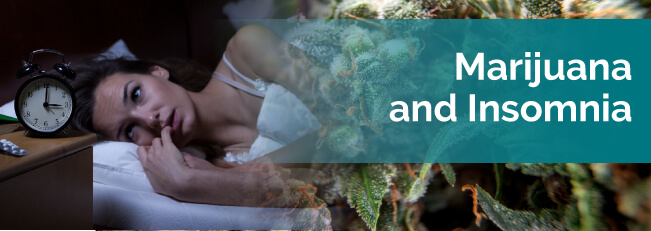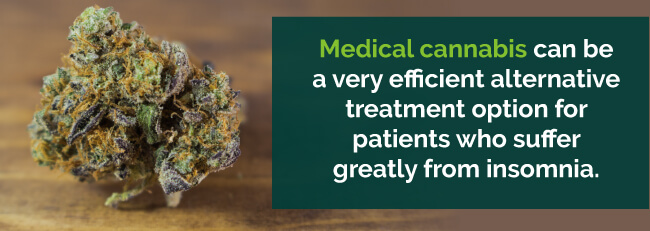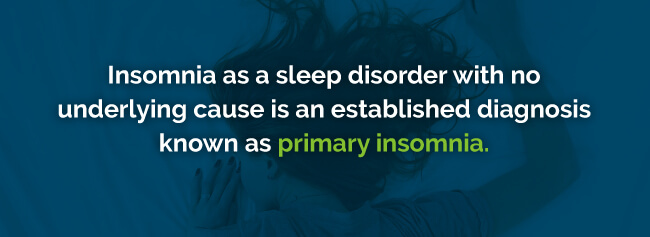
Medical marijuana can help with sleep problems like insomnia. Symptoms like daytime sleepiness, lack of concentration and difficulty sleeping are common problems people experience with insomnia. Nonrestorative sleep can impact your daily functioning and quality of life. Find out more about insomnia, its symptoms and how marijuana treatment can help.
Research on cannabis and insomnia is somewhat limited due to federal regulations. Nevertheless, many studies show effectiveness when it comes to improving sleep with marijuana. Anecdotal evidence from individual users often shows good results when using marijuana to improve sleep.
Medical cannabis can be a very efficient alternative treatment option for patients who suffer greatly from insomnia. Many patients report that, when compared to conventional sleep medications, cannabis works far better, is not habit-forming and leaves them feeling extremely well the next day.

In cases where medical marijuana can treat the underlying cause of insomnia, it will treat the insomnia itself in turn. Medical marijuana may also increase the severity or cause some of these problems, so monitoring by a medical professional to ensure optimal results is necessary.
Some research suggests that medical marijuana can even boost the quality of a person’s sleep and reduce the frequency of nightmares in people with stress-related sleep problems.
Some symptoms medical marijuana and insomnia treatment can help with are:
To start medical marijuana for your insomnia symptoms, you’ll need to consult with a doctor and obtain a written recommendation. Then you’ll need to get a medical marijuana card and go shopping at a cannabis dispensary to obtain your products. MarijuanaDoctors.com is a great place to find a qualified medical cannabis doctor to start the process of obtaining marijuana for insomnia.
One way you can experiment with marijuana and insomnia is by changing how you ingest the substance.
Smoking and vaping weed both cause the effects to kick in right away. This can be beneficial if you’re experiencing severe pain that is contributing to your insomnia. Immediate pain relief makes you feel better overall so you can focus on sleep.
However, the effects of smoking and vaping wear off faster. That shorter period of relief may mean you wake up in the middle of the night when the effects stop. Smoking may also cause breathing issues due to higher levels of byproducts created by combustion.
Another option is consuming edibles infused with cannabis. You’ll have to wait anywhere from 30 minutes to a few hours for the cannabinoids to take effect fully, so edibles won’t make you fall asleep immediately. The benefit of this option is that the effects last much longer than they do with smoking of vaping.
Choosing the right marijuana strain is an important part of the treatment process. Sativa-dominant strains tend to have an energizing and uplifting effect, which is not helpful when you want to fall asleep. Not everyone experiences the “upper” feeling, but it’s generally best to avoid sativa strains when sleep is your goal.

Indica-dominant strains are typically the best choice for treating insomnia. Indica strains usually induce a sleepy feeling that helps you drift off and stay asleep.
The cannabinoid called cannabinol (CBN) tends to have a sedating effect, so choosing a strain high in CBN may be a good choice. Aged cannabis tends to have higher levels of CBN because another cannabinoid, tetrahydrocannabinol (THC), breaks down into CBN as it ages, making it a better choice for getting good sleep.
THC also appears to be effective in treating insomnia. It may help you fall asleep faster with less difficulty, and it may reduce the number of times you wake up in the middle of the night. THC can worsen anxiety symptoms when used in high doses. If your insomnia stems from anxiety or you feel anxiety as a result of your sleep issues, opt for a strain that’s low in THC.
Some strains that may work well for insomnia include:
Finding your ideal strain of marijuana to treat insomnia sometimes takes a little experimenting. Your body may react differently to a particular marijuana strain than someone else’s. If you don’t find success with your first strain, experiment with other options.
Marijuana can cause a significant improvement in your insomnia, but it’s important to fully understand potential side effects. The effects are often mild when compared with traditional medications. Once the marijuana exits your body, those side effects disappear, so they aren’t long-lasting.
Some of the potential effects of using marijuana include:
In comparison, prescription sleeping pills are known to carry a high risk of dependency. With research into medical pot becoming more practically and legally viable by the day, insomnia patients will soon have even more reasons to eschew pharmacological remedies.
Around 30 percent of people will struggle with insomnia at some point while another 10 percent experience chronic insomnia, according to the American Sleep Association. So, if you’re having sleep problems, you’re not alone.
In fact, 37.9 percent of individuals claimed they have fall asleep unintentionally during the day at least once in the previous month. Nearly 5 percent reported falling asleep or nodding off while driving at least once in the previous month. Each year, 40,000 nonfatal injuries and 1,550 deaths occur due to drowsy driving.
With so many individuals suffering with sleep disorders like insomnia, there’s been an increase in interest for cannabis.
Now that you’ve learned how effective medical cannabis is at tackling the unpleasant symptoms of insomnia, let’s go over more about what insomnia is, what causes it, other treatments and more.
Insomnia is a sleep disorder characterized by a persistent difficulty falling asleep, staying asleep or achieving quality slumber. You may wake up earlier than you want and not be able to fall back asleep. The amount of sleep you need to function normally may vary slightly, but adults generally need seven to eight hours nightly.
People suffering from insomnia often get much less sleep than they need, which can affect them during the day. Poor quality of sleep and waking up frequently during the night also affect how you feel during the day.
According to the Sleep Foundation, there are several ways to describe insomnia:
Chronic insomnia often stems from lifestyle habits or medical conditions. Some of the potential causes include:
Insomnia is more than just an annoyance — it can lead to memory problems, depression, irritability or an increased risk of heart disease. The specific symptoms of insomnia may vary but typically include:

Insomnia is frequently followed by functional impairment while awake and can occur at any age. However, this condition is found to be more common in the elderly. This increase in incomnia often stems from less restful sleep as you age, making it easier for you to wake up from minor disturbances. Lack of activity as you age sometimes affects your sleep. Regular exercise helps to improve your sleep, so if you get less exergise as you get older, that could interfere. As you age, you are more likely to have health conditions or take medications that make it more difficult to sleep. Keeping those medical conditions under control can also help alleviate your insomnia issues.
Insomnia is most often thought of as a sign that can accompany several sleep, medical and psychiatric disorders. However, insomnia can also be the primary condition without any other associated conditions. Insomnia as a sleep disorder with no underlying cause is an extablished diagnosis known as primaty insomnia.

Some treatments for insomnia include:
Some treatments for insomnia are non-medical. Therapy may be indicated to treat stress or any other emotional or mental causes of the disorder.
Another non-medicinal treatment is called sleep hygiene. It essentially consists of changing sleep habits and making the sleeping environment more conducive to sleep. It may also include some other lifestyle changes that seem unrelated to sleep but can affect it. These treatments work in some cases of persistent insomnia. They may also simply alleviate the problem enough that it becomes tolerable for the duration of the period of insomnia.
There may also be attempts at correcting sleep cycles before medication is indicated in cases of persistent insomnia. Patients may be told to try to stay awake at night as a sort of reverse psychology. They may also be told to sleep very little and stay away from their beds until they are actually falling asleep.
This is a form of conditioning that helps the person associate the bed with sleep and nothing else. Once the lack of sleep starts to make it easier to fall asleep, a more acceptable sleep schedule can be implemented.
Relaxation techniques can improve sleep by reducing your anxiety at bedtime. Insomnia can make you worry or feel anxious about falling asleep. Those feelings make it even more difficult to sleep. Some people have general anxiety or stress that disrupts sleep. If you can use various techniques to control breathing, heart rate, muscle tension and your mood, you may feel more relaxed and be able to fall asleep easier.
Light therapy may be an option if you fall asleep early at night, causing you to wake up too early. Light therapy helps you adjust your sleep schedule so you stay awake longer. This can be achieved by spending time outdoors during light hours or using a light box for artificial light.
In some cases, sleeping pills may be prescribed to help the patient fall asleep and/or stay asleep longer. While the medication can help in the short term, relying on medications for sleep is not generally recommended for longer than a few weeks. Examples of prescription sleeping pills include eszopiclone, ramelteon, zaleplon and zolpidem.
Some sleep medications are only viable in the short term. It has been shown that long-term use of some sleep aids can cause dependency. Dependency on sleep aids is much like insomnia in that those who are dependent have difficulty falling asleep without medication. This can prolong your sleep issues, creating a cycle that’s difficult to break. Sleeping pills can also cause you to feel groggy during the day. Some users face an increased risk of falling.
Over-the-counter sleep aids may also cause side effects. These issues may include:
Just like prescription sleep aids, these over-the-counter medications may cause you to rely on them to fall asleep.
Some people seek out other alternative treatments, many of which are pursued on their own without medical supervision.
Melatonin is a supplement that some people rely on to fall asleep better. While generally considered safe, it’s unclear how effective it is or if it has any safety issues when used long-term.
Another supplement called valerian is also marketed as a sleep aid. The supplement has a bit of a sedating effect. There isn’t much research on valerian, so it’s unclear how effective it is or what type of side effects it may cause. Some people have suffered from liver damage after large doses or extended use, but it’s unclear if that damage came from the valerian itself.
Many herbal supplements are not regulated by the FDA, so it’s important to proceed with caution with all of them, as these products could cause long-term problems.
These are also used by some people to improve their insomnia. Some of these techniques are used with other treatment options to make them more effective. They tend to have a relaxing effect on your body, which can ease you into sleep.
Medical cannabis could be a better option for insomnia than prescription or OTC sleeping aids.
If insomnia has you up at night, exploring marijuana as an affordable alternative treatment option may help you improve your rest. We can help you find medical marijuana doctors in all legal marijuana states so you can get expert advice on using cannabis to treat your insomnia.
Make your appointment now to find relief from insomnia so you can face your day feeling more rested and ready for anything.
Find A Doctor Find A Dispensary